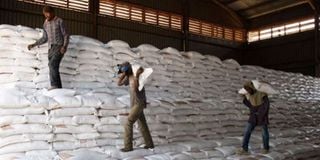Farmers dealt a blow as cheap fertiliser budget cut by Sh6bn

Workers arrange bags of subsidised fertiliser at the National Cereals and Produce Board depot in Elburgon, Nakuru County.
Farmers have been dealt a blow after the government slashed allocation for subsidised fertiliser from Sh16.2 billion to Sh10 billion.
In the 2024/2025 financial year budget estimates, Agriculture and Food Security received Sh48.23 billion up from Sh47.253 in the 2023/2024 period, representing an increase of Sh977 million despite its major role in transforming the country’s economy.
But the allocation for subsidised fertiliser has been reduced from Sh16.2 billion to Sh10 billion, a move likely to reverse gains made in boosting food security and easing inflation.
““Fertiliser is a key component in crop production and reduced allocations means some farmers are likely to miss out from the vital farm input,” said Mesah Koech, a farmer from Moiben, Uasin Gishu County.
Agriculture forms the backbone of our economy and the budgetary allocation will have minimal impact in motivating farmers to increase acreage under crop production, due to the rising cost of farm inputs and unsteady market for the produce,” said Kipkorir Menjo, a director Kenya Farmers Association (KFA) during a farmers’ meeting in Eldoret.
Sh2,500
The government subsidised fertiliser goes for Sh2,500 for 50kg bag compared to Sh5,400 in the retail market but some farmers miss out in the allocation, forcing them to plant the crop without applying the fertiliser, resulting in low yield hence declined income from the investment.
It costs a farmer Sh4,500 to plough an acre of land with the production of a 90-kilogramme bag of maize estimated at Sh1,700, making the production the highest in the East African region.
In the budget estimates, Small Scale Irrigation and Value Addition project was allocated Sh647 million while Emergency Locust Response received Sh2.5 billion and Sh2.4 billion was allocated to empower Youth and Women in Agriculture.
The National Agricultural Value Chain Development Project got Sh6.1 billion, the Food Security and Crop Diversification Project received Sh642 million and Livestock Resource Management and Development was allocated Sh1.2 billion.
Support livestock farming
To support livestock farming and promote value addition, National Treasury Cabinet Secretary Njuguna Ndung’u in the budget estimates allocated Sh300 million for Development Leather Industrial Park –Kenanie, Sh1.0 billion for MSMEs Agricultural Credit, Sh11.3 billion for Blue Economy Priority projects and Sh182 million for the National Drought Emergency Fund.
Small scale farmers have taken issue with the allocation of Sh1.9 billion against demand of Sh10 billion to Agricultural Finance Corporation (AFC), which advances loans to them to increase acreage under crop production.
The government agency receives loans applications amounting to over Sh15 billion annually against an offer of about Sh4 billion resulting in majority of the farmers not benefiting from the credit facility.
In the 2024/2025 budgets estimates, allocation to the manufacturing has reduced from Sh22.789 billion to Sh21.754 billion, representing 4.54 per cent decline that is likely to affect investment in the sector.
Investors in the Agro-processing industries and textile and apparel are among the manufacturing sectors that will be hurt by the reduced allocation.





